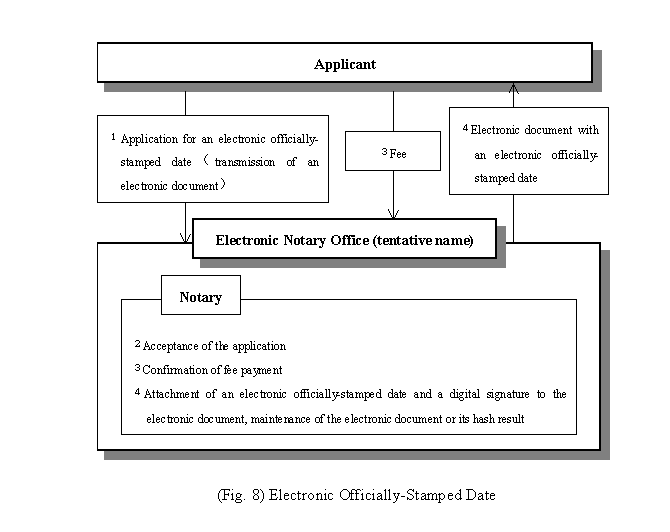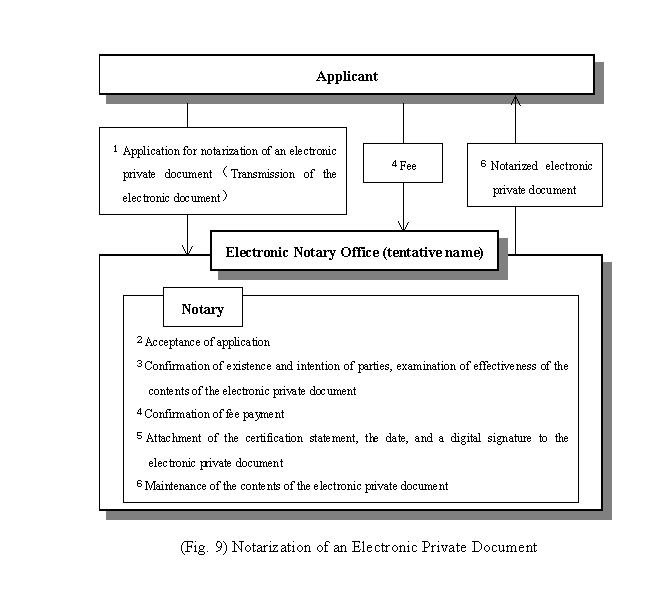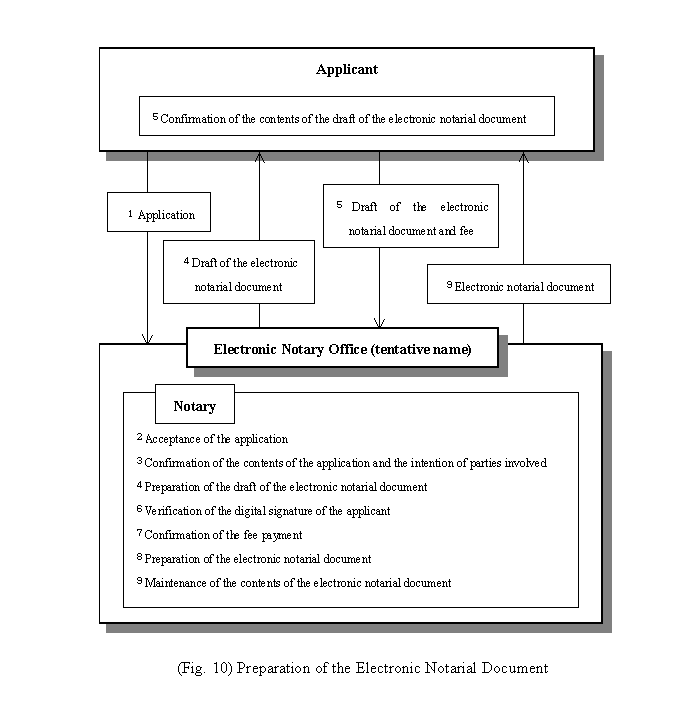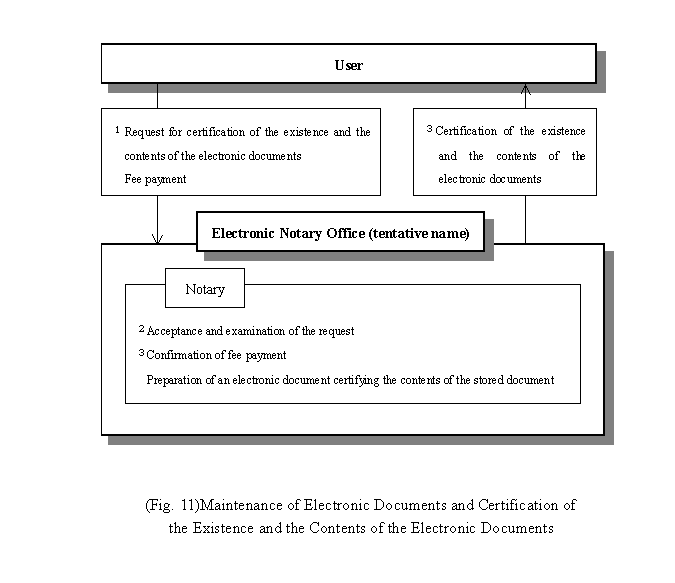3 Electronic Notarization System based on the Notarization System
(1) Meaning of Electronic Notarization
Prior to the discussion on the electronic notarization system, the meaning of electronic notarization should be discussed to determine the scope of studies.
At present, the word "electronic notarization" is used in a variety of contexts and its definition is obscure. First of all, the word sometimes means extension of the scope of the current notarization service, now handling only paper-based documents, to electronic documents. In such a case, the electronic notarization service would likely be operated by the bodies administering the current notarization system and would offer the same service as the current notarization system, so that the meaning of electronic notarization would be relatively clear.
In fact, broader meanings are sometimes given to the word "electronic notarization", that is, the word sometimes includes data retention service and time stamping service offered by private entities.
In the Study Group, there is an opinion that the "electronic authentication" should certify "who" the originator of data is and that the "electronic notarization" should certify "when" data originated and "what" the contents are.
The following discussions concern issues on the extension of the scope of the current notarization service to electronic documents. In this report, the word "electronic notarization" is in principle used to indicate this concept. In the past, the word "notarization" has been used to indicate those operations conducted by legally authorized public entities. If services offered by private entities are included in "electronic notarization", such usage of the word would not be accurate from the legal standpoint and would not be appropriate because users would be likely to think that such services offered by private entities have the same legal effects of traditional notarization.
Of course, there are issues about what legal effects should be permitted and what legal regulations are required for data retention services and time stamping services offered by private entities, which differ from the issues investigated here. At present, there seem no direct issues necessitating the establishment of new regulations on these matters. Further studies should be conducted, taking into consideration the trend of services of private entities.
(2) Necessity of the System
In Japan, the Notary Law governs the notarization system and the notaries provide the notary service. Notaries can attach an officially-stamped date to certain documents to certify the date when a document is prepared (Art. 5(2) and 6 of the Enforcement Law for the Civil Code) and can examine the contents of certain documents to notarize certain private documents to certify the existence and the contents of documents to prevent future disputes (Art. 1 of the Notary Law). In addition, notaries can prepare notarial documents to certify the execution of contracts and legitimacy of their contents.
The notarization system is thought to be reliable by the public and is widely used in transactions. This is because the law ensures the reliability of operations of notaries: the Minister of Justice appoints and supervises notaries who have professional knowledge and careers in legal affairs; notaries act in a disinterested and public position (in relation to this, there are restrictions on notaries holding other jobs (Art. 5 of the Notary Law), etc.); the disinterested operations of notaries is ensured by such laws as the Penal Code (Art. 156); and the State Redress Law would be applied to inappropriate operations of notaries.
It is possible then, to establish a system to extend the scope of the current notarization system to electronic documents in order to allow secure electronic commerce. This is the purpose of the electronic notarization system based on the notarization system. In fact, certain demand for the electronic notarization system is confirmed through the Questionnaire. In particular, more than 50% of the persons surveyed recognize the necessity of the system for an electronic officially-stamped date and nearly 50% want to use the system.
On the other hand, there are some opinions on some issues caused by the relative ease with which electronic notarial documents that have strong legal effects can be prepared, when composed with preparing paper-based notarial documents. In the current notarization system, certain strict procedures are required to prepare notarial documents. This seems to be not only to ensure the authenticity of the contents of the notarial documents, but also to ensure prudent decisions of parties. In electronic notarization system, it may not be clear whether such prudent decisions can be ensured because applicants can access notaries very easy through computer networks. In addition, it is not clear whether there is concrete demand for the preparation of electronic notarial documents. Details of the electronic notarization system should be constructed taking the above-mentioned issues and demand for the system into account.
(3) Details of the System
- Outline of the Service
The following are the possible services of the electronic notarization system that offer the same functions as those of the current notarization system. The following electronic notarization system is based on public key cryptography.
(a) An Electronic Officially-Stamped Date
A notary shall attach an electronic officially-stamped date and his/her digital signature to an electronic document.
(b) Notarization of an Electronic Private Document
A notary shall inspect the contents and effectiveness of an electronic private document and attach a certification statement and his/her digital signature to the document.
(c) Preparation of an Electronic Notarial Document
A notary shall verify the identity of parties to a contract, prepare an electronic notarial document, and attach his/her digital signature to the document.
(d) Maintenance of Electronic Documents and Certification of the Existence and the Contents of the Electronic Documents
A notary shall maintain electronic notarial documents, notarized documents and electronic officially-stamped documents and certify the existence and the contents of the electronic documents.
All of these services will not be necessarily started at the same time. For example, an electronic officially-stamped date, demand for which is confirmed through the Questionnaire and whose system is relatively simple, can precede other services.
- Details of the System
There are three possible options for systems to allow the above-mentioned services.
(a) A System for the Existing Notaries as Electronic Notaries
This is a system for offering the electronic notarization system mentioned in a. at the existing notary offices. In this system, all or some of the existing notary offices deal with the electronic notarization service independently and all of operations of the electronic notarization are completely handled in each notary office.
The system seems to be the very extension of the scope of the current notarization system to electronic documents and to be consistent with the current Notary Law and the notarization system. In addition, applicants can easily choose the most convenient notary office by accessing notary offices through computer networks and applying for electronic notarization.
On the other hand, each notary office must have a computer system to deal with operations of electronic notarization completely in order to realize such a system. To introduce and maintain such a computer system may be a heavy burden for individual notary offices. Necessity of providing each notary office with such a computer system is not clear, while there may be such a burden.
(b) A System to Establish the Electronic Notary Office (Tentative Name) as an Independent Entity
This is a system in which the Electronic Notary Office as the only office for electronic notarization is newly established, apart from the existing notary offices. But it may be possible for the Electronic Notary Office to handle existing notarization service.
In the system, only the Electronic Notary Office will have a computer system necessary for the electronic notarization. As a result, data are efficiently managed by a centralized system and the burden to establish such a system will be lighter. In addition, all applications for electronic notarization shall be sent only to the Electronic Notary Office and applicants can easily know where to submit their applications.
But in the system in which all applications should be submitted to the Electronic Notary Office, applicants cannot nominate a notary they use freely, although applicants can nominate a notary freely in the current notarization system. But, on the other hand, there seems little necessity to let applicants freely choose a notary they use, because laws providing the requirements for notaries and so on ensures that all notaries can properly execute their duties.
(c) A System to Establish the Electronic Notary Center (Tentative Name) as a Network Intermediary for Users and Notary Office
This is a system in which each notary office conducts operations of the electronic notarization and the Electronic Notary Center is established as a network intermediary for users and notary offices. In the system, the Electronic Notary Office will accept applications, provide applications to the notary offices and maintain electronic documents. Existing notary offices will attach an officially-stamped date to electronic documents, notarize an electronic private document and prepare an electronic notarial document when applications are provided by the Electronic Notary center. Of course, there can be some notaries at the Electronic Notary Center dealing with operations of the electronic notarization other than notaries at the existing notary office. It is also possible for an existing notary office to play a part of the Electronic Notary Center.
Such a system seems to be consistent with the current Notary Law and the notarization system because current notary offices deal with operations of the electronic notarization. In the system, it is also possible for applicants to choose the notary they use. The system seems convenient for applicants because applicants can easily know where to submit their applications. In addition, the cost to establish the electronic notarization system will be relatively low in comparison to the system in which each notary office has a computer system to deal with the electronic notarization completely, as the electronic documents concerning the electronic notarization is kept in the centralized system in the Electronic Notary Center.
It seems appropriate to establish the system of (b) because at present there may not be much demand for electronic notarization that all notary offices should deal with the operations of electronic notarization. In the future, the system of (c) should be taken into consideration.
The following are the details of services offered by the system of (b).
c. Necessary System
In the system (b), the Electronic Notarization Office should have computer systems to prepare electronic documents, attach the digital signature of notaries to them, and maintain electronic documents. Public keys used to verify digital signatures of notaries must be published in a secure manner. It may be possible for a certification authority operated by the commercial registry (see 2 (2) b) to issue a certificate for the notaries.
d. Details of the System
(a) An Electronic Officially-Stamped Date
The procedure for an electronic officially-stamped date is as follows.
- An applicant shall apply for an electronic officially-stamped date on an electronic document. The current officially-stamped date shall be given to a paper-based documents with a signature (Art. 5(2) of the Enforcement Law of the Civil Code), but it may be possible to attach an officially-stamped date to an electronic document with no digital signatures or digital images or the like. In applying for an electronic officially-stamped date, an electronic application form as well as the document to which an electronic officially-stamped date is attached should be submitted. It should be discussed whether a certain digital signature must be attached to the application form to confirm the intention to apply for electronic notarization.
It can be possible to permit applicants to apply for an electronic officially- stamped date by submitting a diskette or the like in which the electronic document is recorded to the Electronic Notary Office other than by on-line application.
- The Electronic Notary Office shall accept the application.
- The applicant shall pay a fee and the notary shall confirm the completion of fee payment. Payment procedure should be determined in the future. It may be possible to make applicants pay fees in advance or to utilize electronic payment systems in the future.
- The notary shall attach an officially-stamped date and his/her digital signature to the electronic document, transmit it to the applicant, and keep a hash result of the electronic document. The notary shall maintain the document itself if the applicant wants. The statement for the electronic officially-stamped date should be clearly distinguished from the certification statement for the notarization of an electronic private document.
- An applicant shall apply for an electronic officially-stamped date on an electronic document. The current officially-stamped date shall be given to a paper-based documents with a signature (Art. 5(2) of the Enforcement Law of the Civil Code), but it may be possible to attach an officially-stamped date to an electronic document with no digital signatures or digital images or the like. In applying for an electronic officially-stamped date, an electronic application form as well as the document to which an electronic officially-stamped date is attached should be submitted. It should be discussed whether a certain digital signature must be attached to the application form to confirm the intention to apply for electronic notarization.

(b) Notarization of an Electronic Private Document
The procedure for notarization of an electronic private document is as follows.
- An applicant shall apply for notarization of an electronic private document. The question of what kind of electronic documents can be notarized should be discussed. At least, an electronic document with a certain digital signature should be notarized, but in such a case, requirements for a digital signature should be determined. The following is the procedure for notarization of an electronic private document with a digital signature.
- The Electronic Notary Office shall accept the application.
- The notary shall confirm the existence and intention of parties involved by verifying a digital signature attached to an electronic private document or some other measures and examine the effectiveness of the contents of the electronic document.
- The notary shall confirm the completion of fee payment.
- The notary shall write a certification statement and the date on the electronic private document and attach his/her digital signature to it.
- The notary shall transmit a notarized electronic private document with notary's digital signature to the applicant and maintain the contents of the document.

(c) Preparation of an Electronic Notarial Document
The procedure for the preparation of an electronic notarial document is as follows.
- An applicant shall apply for the preparation of an electronic notarial document.
- The Electronic Notary Office shall accept the application.
- The notary shall confirm the content of the application and the intention of parties involved. Measures to be taken for the purpose of confirmation at this stage need not be so strict.
- The notary shall prepare a draft of an electronic notarial document, attach his/her digital signature to it, transmit it to the applicant, and direct the applicant to attach the digital signature of the applicant to the draft and to transmit the draft to the notary.
- The applicant shall verify the digital signature of the notary, confirm the contents of the draft, attach a digital signature to it, and transmit it to the notary.
- The notary shall verify the digital signature of the applicant.
- The notary shall confirm the completion of fee payment.
- The notary shall confirm the appropriateness of the transmitted draft of the notarial document and attach a certification statement, a date, and his/her digital signature to the document.
- The notary shall transmit the electronic notarial document with a digital signature to the applicant and maintain the contents of the electronic notarial document.

(d) Maintenace of Electronic Documents and Certification of the Existence and the Contents of the Electronic Documents
The procedure for certification of the existence and the contents of the electronic documents handled by the notary and kept in the Electronic Notary Office is as follows.
- A user shall request the notary to certify the existence and the contents of the electronic document maintained in the file of the Electronic Notary Office.
This service is similar to the current notarization system in which the originals of notarial documents and notarized articles of incorporation are kept by notaries so that the originals of documents can be published and their copies can be published. So it may not seem necessary to keep the contents of electronic documents with an officially-stamped date and notarized electronic private documents (other than notarized articles of incorporation), because such documents are not kept by the notary and are not published in the current paper-based notarization system.
But in the current notarization system, the Notarization List (Art. 61 of the Notary Law) to record the outlines of applications for notarization of private documents and the Officially-Stamped Date List (Art. 6 of the Enforcement Law for the Commercial Code) to record the outlines of the application for the officially- stamped date are prepared, although the contents of the documents themselves are not maintained. So in establishing the electronic notarization system, contents of notarized private electronic documents and electronic documents with officially- stamped dates should be maintained to certify the contents by extending the function of the current Lists. Such system can clarify the contents of the applications and may be convenient for applicants and other users. Clarifying the contents of the documents will prevent disputes on the contents of stored documents. But if there is a huge volume of data of electronic documents, it may be practically impossible to keep all of the contents of the relevant documents. In such a case, only hash results of each notarized electronic private document and document with an officially- stamped date may be maintained, although all of the contents of such documents can be stored for a fee when applicants want notaries to do so. Details of this service should be further discussed, considering the demand for the service in the future.
Applicants should be permitted to report to the Electronic Notary Office in person to request certification of the existence and the contents of the electronic documents, as well as on-line.
It seems appropriate to maintain the electronic documents handled by the notaries for a certain period of time. The period may be the same as the period of time during which the original documents are maintained in the current notarization system.
- The notary shall accept the request and examine whether the user has the right to request certification. In examining the request, a digital signature may be used and in some cases certain documents may be required to examine whether the user is qualified to request certification.
- The notary shall confirm the completion of fee payment, attach his/her digital signature to the electronic documents maintained in the file of the Office, and transmit the electronic document to the user. When a user wants to receive a paper-based certificate certifying the contents of the electronic documents, the notary shall print the contents of the electronic documents, attach a signature and a seal of the notary to the paper-based certificate, and issue it to the user.

